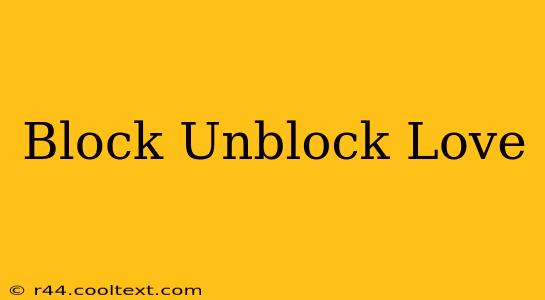The digital age has revolutionized romance, introducing new complexities and challenges. One such phenomenon is the "block, unblock" cycle on social media and messaging apps – a confusing and often frustrating dance that many find themselves caught in. This post explores the psychology behind this behavior, its potential meanings, and how to navigate this tricky terrain of modern relationships.
Understanding the Block/Unblock Phenomenon
The act of blocking someone signifies a clear desire for distance, a need to create space, and often reflects a significant level of emotional distress or anger. It's a powerful statement, severing communication channels and often leaving the blocked individual feeling hurt and confused.
Unblocking, however, muddies the waters. It suggests a shift in perspective, a reconsideration of the previous decision. This seemingly simple action can carry a multitude of interpretations, ranging from genuine regret to manipulative game-playing.
Why Someone Might Block You:
- Need for Space: Sometimes, a block is simply a request for temporary distance, a way to process emotions or deal with overwhelming feelings without constant contact.
- Anger and Hurt: Significant conflict can lead to a blocking action as a way to prevent further escalation or hurtful exchanges.
- Protection: Individuals might block someone to protect themselves from emotional abuse, harassment, or unwanted attention.
- Moving On: A clean break can be easier to achieve with a block, severing the ties and making it harder to relapse into old patterns.
Why Someone Might Unblock You:
- Regret and Apology (Implicit or Explicit): The unblock could signal remorse, a desire to reconnect, and potentially an attempt at reconciliation.
- Curiosity: Sometimes, the unblock is driven purely by curiosity – wanting to see your activity, posts, or updates without engaging directly.
- Manipulation: Sadly, unblocking can be a tactic to check in on someone without direct responsibility or accountability.
- Accidental Unblock: It's possible the unblock was unintentional, a simple mistake.
Deciphering the Signals: What Does It Mean?
Interpreting a block and unblock requires careful consideration of the context. Consider your relationship history, the nature of the conflict (if any), and the timing of the actions.
Factors to consider:
- Frequency: Repeated blocking and unblocking might suggest an unstable or unhealthy dynamic.
- Communication: Has there been any other communication outside of the blocking/unblocking actions? A sincere apology following an unblock holds more weight than a silent action.
- Your Own Feelings: Trust your gut. If the situation feels manipulative or unhealthy, it likely is.
Navigating the Block/Unblock Cycle
The best approach is often proactive communication (if appropriate and safe). Avoid engaging in a game of reciprocation – blocking and unblocking back will only escalate the situation. If the behavior is recurring and causing emotional distress, consider taking a step back and focusing on your own well-being.
Healthy responses:
- Self-reflection: Understand your role in the situation and identify any patterns of behavior that may be contributing to the conflict.
- Setting boundaries: Establish clear boundaries regarding communication and interaction.
- Seeking support: Lean on friends, family, or a therapist for support and guidance.
The block/unblock cycle in relationships is a complex phenomenon. While it might seem like a simple online action, it carries significant emotional weight. By understanding the underlying motivations and navigating the situation with care and self-awareness, you can better manage these challenging interactions. Remember, your emotional well-being is paramount.

